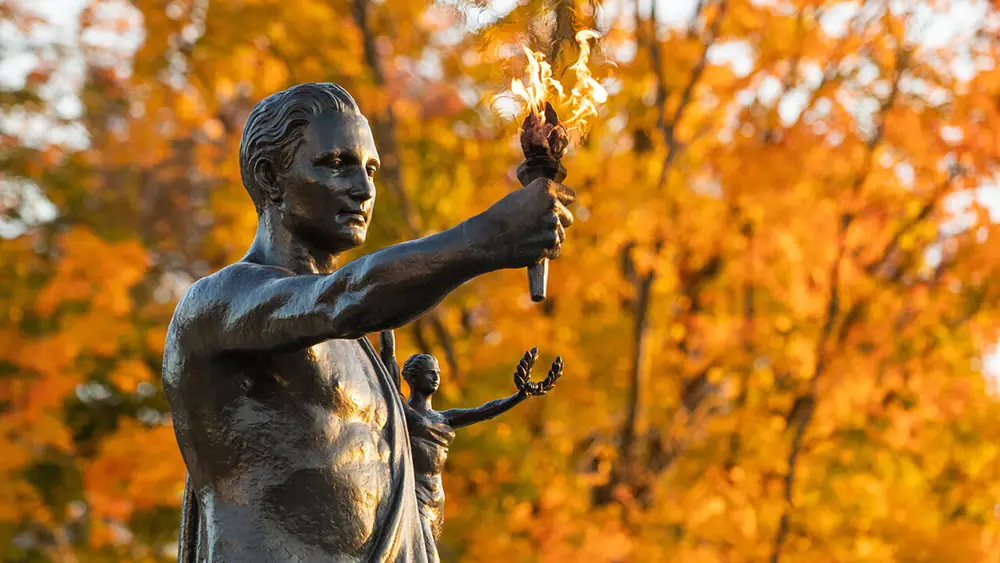New Courses and Focus on Career-Readiness Equip Vols with Tools for Success

The College of Arts and Sciences’ dynamic range of academic programs and career-focused advising prepare our students with valuable skills, content knowledge, and the vocabulary to successfully promote themselves in the ever-evolving job market.
New programs introduced for students in 2024 include a bachelor’s degree in actuarial science, which prepares students to evaluate and mitigate risks in the financial industry, a bachelor’s degree in supply chain sustainability, and several five-year accelerated bachelor’s-plus-master’s programs.
“These new and expanded degree programs offer our students tremendous opportunities in building strong career foundations, while also offering them flexibility in pursuing additional academic interests through a complementary minor or second major or through coursework in one of our several interdisciplinary programs,” said Robert Hinde, Interim Executive Dean of the College of Arts and Sciences.
Flexible, Interdisciplinary Opportunities
In addition to these expanded majors, students from across the university can enroll in one of the college’s three new minors: computational social sciences; digital humanities; and interdisciplinary studies in science, technology, health, and society. Plus, four new undergraduate certificates are available: actuarial science, animal behavior, justice studies, and teaching English to speakers of other languages.
The college also added two fully online bachelor’s degree programs in political science and religious studies in Fall 2024.
Several departments in the college launched new accelerated bachelor’s-plus-master’s programs this year. These programs allow a student to earn a bachelor’s degree and a master’s degree in just five years. Students can take advantage of new five-year programs in climate and climate change, criminology, critical race and ethnic studies, economics, geographic information science and technology, political science, sociology, sustainability, and urban studies.
Career Focus for Any Degree
The college’s advising office is the go-to source for undergraduate arts and sciences Vols looking for guidance on navigating new or long-standing required courses for their majors and identifying minors that enhance these degrees. A core part of the advising mission is working in partnership with the Center for Career Development and Academic Exploration to help students develop the vocabulary to explain their career readiness for a successful transition into the workplace or graduate school.
One important tool for arts and sciences advisors is “Competencies for a Career-Ready Workforce,” developed by the National Association of Colleges and Employers (NACE). This valuable guide provides a way to assist students in understanding, or reframing, how they approach Vol Core (general education) courses and offers them ways to talk about what they bring with them when meeting with potential employers.
“The NACE Competencies list gives students the vocabulary to talk about the skills and the competencies that they’re gaining as they earn their undergraduate degree with us,” said Shanna Pendergrast, director of CAS advising services. “In some other colleges, there’s a direct correlation between them being able to say, ‘I major in this thing, and I do this job.’ That’s not always the case in arts and sciences, where one might say, ‘I major in this thing, and I can do any of these jobs.’ They are equipped for a variety of different careers, and that can sometimes be overwhelming for students.”
Expressing Career-Readiness
NACE’s eight career-readiness competencies are:
- Career and Self-Development
- Communication
- Critical Thinking
- Equity and Inclusion
- Leadership
- Professionalism
- Teamwork
- Technology
“The competencies provide students a common language to talk about what they’ve gained based on what employers have said that they’re looking for, and in a really thoughtful and intentional way,” said Pendergrast.
The competencies are not new ideas. CAS faculty have always helped students develop, both personally and professionally, in these areas that speak to the very purpose of a classic liberal arts education. The NACE list pulls these ideas together and helps students focus on what these skills are in a tangible way.
“It’s about helping students understand what they’re getting while they’re here,” said Pendergrast. “In some cases, it’s about helping change a student’s perspective on why they are taking a course.”
Sense of Purpose
A student may not find excitement in taking a general education course that doesn’t obviously address their major.
“If we can help them think about the skills and the competencies that they’re gaining from the course, I think that helps change their motivation,” she said. “Or if not their motivation, it helps them understand what they’re gaining from the course and may result in them being more willing to do the work and help to hone and develop that skill further.”
With the potential competencies in mind, students can approach a variety of courses with a stronger sense of purpose.
“It’s no longer solely about the content, but it’s about all of the other things that they’re gaining from the course through the lens of that department,” said Pendergrast.
Spread the Word
In addition to advisors helping students appreciate and communicate about their growing skill sets, Pendergrast also wants to get more faculty members in the loop to reinforce the message.
“My hope is that we can help faculty know more about the career readiness competencies, so that it is a thread of information that students get throughout the college,” she said. “We have classes that are already doing these things, and faculty have the opportunity to help students put this vocabulary behind what they’re already teaching them in their class.”
Having faculty identify and highlight the competencies students gain by taking their classes helps create a full circle of awareness for students in communicating their broad range of skills in an ever-evolving world of careers.
“A lot of our students are going to end up doing jobs that don’t exist yet,” said Pendergrast. “How can we prepare students to do a thing when we don’t know what it is? We can guide them in developing the core competencies that broadly prepare them for successful entrance into their career or continued education.”
By Randall Brown